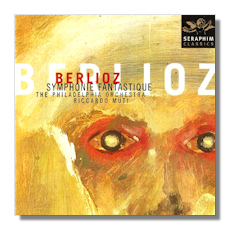
The Internet's Premier Classical Music Source
Related Links
- Berlioz Reviews
- Latest Reviews
- More Reviews
-
By Composer
-
Collections
DVD & Blu-ray
Books
Concert Reviews
Articles/Interviews
Software
Audio
Search Amazon
Recommended Links
Site News
 CD Review
CD Review
On disc, Riccardo Muti and the Philadelphia Orchestra never received the acclaim or popularity that Eugene Ormandy had with these same forces. The comparison isn't especially fair; Ormandy recorded everything under the sun, often very well. Muti was – and in many was remains – an exciting conductor with wide musical sympathies. At this point in his career, he could simply be thrilling, and as long as he stayed away from Beethoven, Brahms, and Mozart, he was generally able to mesh this excitement with the ensemble's typically plush sound.
In French music, Muti is an unsung advocate, much like Seiji Ozawa was in Boston. Unlike Ozawa, Muti was not gifted with an inherently "French" orchestra, and Ormandy was never a great conductor of either Debussy or Ravel. He was a fine conductor of Berlioz, but Muti is arguably the finer talent here. He obtains simply stunning playing from a technical standpoint, but also manages to convince his players to "let go" more than they would have previously. The results aren't as frenzied as Charles Munch, but will likely please those who find Colin Davis just a touch too polite (he generally was). The sound always was less than exceptional, given that EMI was still struggling to make digital sound good at this point. That said, everything packs quite a punch when it needs to. There is no coupling, and some may see that as poor value. I don't understand why (then) EMI could not have added some of Previn's underrated Overtures to the mix, or perhaps one of Bernstein's French recordings.
Differences between this recording and Muti's live 2010 account just released on CSO Resound CSOR-9011501 are telling. Great as that account is (and enhanced by the rare sequel to this work), I lean toward this one as an overall accomplishment. For one, the younger Muti tasks far more risks. Phrasing is freer and more flexible. Additionally, the Philadelphia Orchestra plays with a richer tone palate than the Chicago Symphony does. Elsewhere, differences are smaller. Muti still nails the climaxes when he needs to, and he still highlights the Classicism in both instances. But generally speaking, this earlier account has that much more drive and conviction. It is also very cheap; finding this disc used for a couple dollars should be no problem. For Muti's most recent thoughts on this music, you'll need the two-disc Chicago Symphony set, but to hear the Muti/Philadelphia partnership at its apex, you will need this disc, too.
Copyright © 2015, Brian Wigman



















